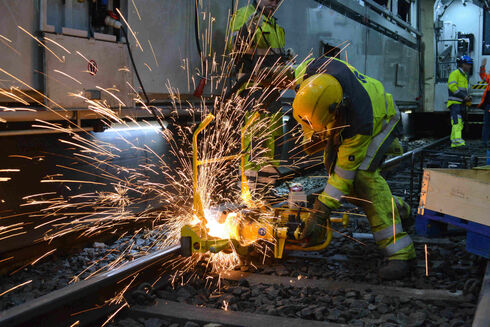
On the green track
7 January 2021

While some railway announcements cause concern or consternation, like delays caused by leaves on the line or the wrong sort of snow, news from Network Rail a month or so ago struck a significant chord.
It has announced a major step forward in tackling climate change by becoming the first railway company in the world to set independently verified, science-based targets to limit global warming.
The company has committed to cutting emissions which limit warming to 1.5 degrees Celsius – below the 2 degrees scientists declared necessary to meet the Paris Agreement.
Chief executive Andrew Haines said: “Rail is already the cleanest and greenest mode of transporting large numbers of people and goods, but we’re committed to cutting our carbon footprint even further.
“We’re on an important journey – to support the government’s target of being net-zero by 2050, to help the country build back better as we recover from the pandemic and to help passengers and freight users make the greenest choices they can.”
Network Rail is already making progress in reducing its greenhouse gas emissions. All of the energy used to power its stations, depots and offices comes from renewable sources, and a trial to move its maintenance vehicle fleet to electric vehicles is under way.
In addition, the company is looking at how it can use its land to generate renewable electricity.
This has significance for equipment hirers, and not just for those specialists serving rail contractors.
Network Rail says that around two-thirds of the railway’s emissions are generated by its suppliers, and so it is keen to work with its wider supply chain, to help them to set their own targets.
Martin Frobisher, Network Rail’s safety, technical and engineering director, said: “We need to give our suppliers confidence that we are serious about this and must make the changes needed to meet these challenging targets.”
Other major companies are also putting green issues at the heart of their operations.
Last month Balfour Beatty launched a refreshed version of its sustainability strategy, Building New Futures.
It focuses on three core areas – the Environment, Materials and Communities – with each assigned a bold 2040 ambition. The company says it will be reporting annually on its progress and against clearly defined 2030 targets.
Leo Quinn, Balfour Beatty Group Chief Executive, said: “As we emerge from 2020 and the impacts of COVID-19, we are presented with an opportunity to build back better – smarter, faster and greener.
“Our new sustainability strategy recognises the widespread benefits that construction and infrastructure can generate; not just in sustainable lower carbon and greener infrastructure, but in a smarter supply chain, with a more diverse and inclusive workplace, in supporting communities and in stimulating national and local economic growth.”
Whether operating in rail or construction, contractors will seek more environmentally ways of working, giving impetus to a green trend that has been evident for some time. Hirers and suppliers will need to cater for this demand.
• The Paris agreement in 2015 saw 195 of the world’s governments commit to prevent climate change by limiting global warming to well below 2 degrees Celsius.
Science-based targets are adopted by companies that are in line with what the latest climate science says is necessary to meet the goals of the Paris Agreement. Targets that limit emissions to a 1.5 degree warming scenario are considered the most ambitious.

